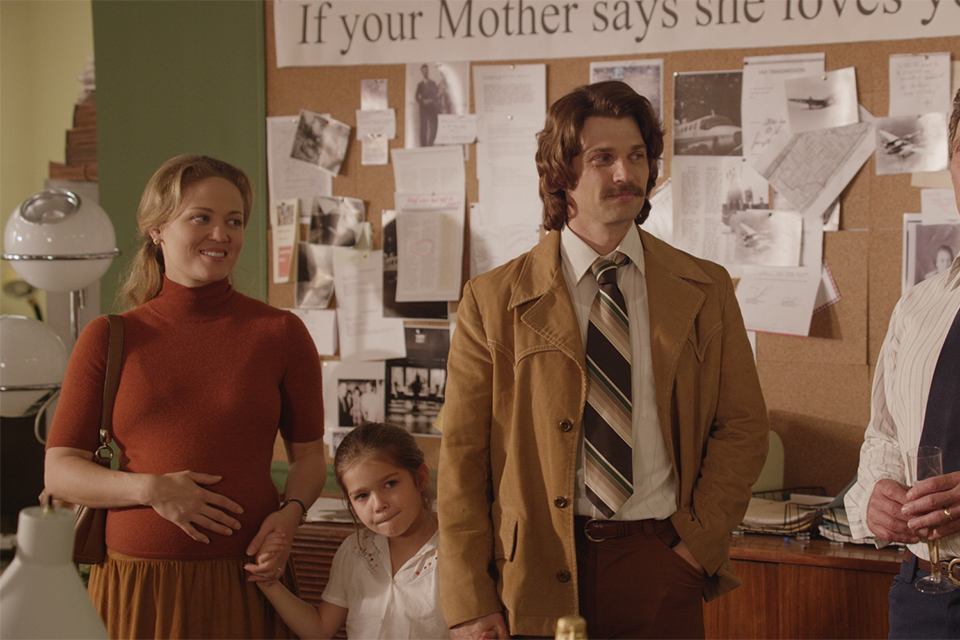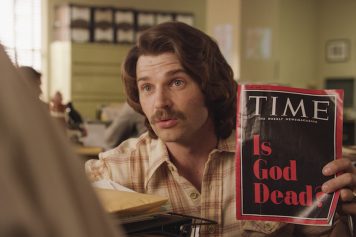
Lee Strobel and his wife Leslie were moved to tears as they watched clips depicting their early marriage and family struggles play out in the movie version of The Case for Christ.
“I was an atheist. I was living a narcissistic and hedonistic and self-absorbed and drunken, immoral life. So watching that portrayed is difficult,” Lee explained.
The feature film is based on Lee’s international bestselling autobiography, The Case for Christ, which has sold over five million copies since it was published nearly 20 years ago.

Five million copies.
Perhaps its popularity had to do with his spiritual journey—from skeptic to Christian—being rather unique.
What began for the award-winning Chicago Tribune legal editor as a quest for evidence against Christ, instead became the very reason he accepted Him as Lord and Savior.
Since then, Lee has penned more than 20 books and spent his life sharing about Christ and defending Him all over the world, including at the Billy Graham Training Center at The Cove.
A Painful Personal Story
The Case for Christ screenwriter Brian Bird knew he needed to tell Lee and Leslie’s personal story if he was going to engage a film audience.
In one storyline, he shows the painful unraveling of their love story after Leslie finds faith in Christ, something the book didn’t cover in detail.

Bird draws the second storyline straight from the book, paralleling Lee’s Jesus search with a crime story he’s investigating—and showing how Lee missed the truth in both cases on the first go-round.
The screenwriter skillfully entwines these stories with evidence presented by a number of scholars and experts to fill in millions of readers’ imaginations and show the pain both Lee and Leslie experienced.
Bird explains that to Lee, when Leslie became a Christian, it was as if she had joined a cult.
“[Lee’s] whole motivation for The Case for Christ [investigation] was to debunk it, to disprove it and prove it was all a big con so he could rescue her,” Bird said.
Lee didn’t hold back his feelings in the book:
“I rolled my eyes and braced for the worst, feeling like the victim of a bait-and-switch scam. I had married one Leslie—the fun Leslie, the carefree Leslie, the risk-taking Leslie—and now I feared she … would trade our upwardly mobile lifestyle for all-night prayer vigils and volunteer work in grimy soup kitchens.”
And though it was painful to live with her husband’s criticism of her new faith, Leslie never gave up on him—even when he wanted to divorce her.
Over time, Lee became intrigued with the changes in Leslie’s values and character, and how she never stopped loving him through it all.
After finding a mountain of evidence for Christ, the irony was undeniable. The Yale Law School graduate wrote, “It would require much more faith for me to maintain my atheism than to trust in Jesus of Nazareth!”
Accepting the Verdict
On November 8, 1981, Lee Strobel—now an atheist-turned-believer—reached out to the One he had so adamantly tried to refute.
Though it was hard to accept the verdict he’d reached, Lee took a leap of faith and prayed, asking for forgiveness and turning over his life to Christ.

Actor Mike Vogel portrays Lee Strobel in the movie, and after watching this scene unfold on set, Lee walked over to him.
“Often those kind of scenes are hokey—but he did it with such integrity,” said Lee. “I tried to thank him and I just started crying. And I put my arms around him and just whispered in his ear, ‘Thank you for being authentic and honest in portraying that.’”
Vogel, who also appeared in The Help, among other movies, is vocal about the stigma among some in Hollywood when it comes to faith-based films.
“I’ll take a lot of flak for it but I’m unapologetic about it,” he said.
“I think we have no excuse as Christians to not be making films, and we do sometimes, but we serve the ultimate artist, the ultimate Creator.”
Talking Faith with Millennials
Steve Fedyski, Chief Operations Officer for Pure Flix, who produced The Case for Christ, talked about why the evidence for the Christian faith is key for millennials, especially non-believers.
“Our youth are very smart and don’t want to be told anything but are definitely curious if you’re trying to make a case on something,” he explained.
“They’re smart, they’re informed, and they want to know. So just saying ‘Christ’ isn’t going to scare them off.”
Lee’s hope is that the film will open the door for discussions, authentic conversations and dialogue about faith issues. “I think that’s so important. Give people room to ask questions and to doubt.”
“God Rescued Our Family”
Lee and Leslie Strobel are counting their blessings these days, thankful for a strong marriage and how their faith has now rippled through the generations,
“God rescued our family and changed our family,” said Lee.
For the former atheist, it was the Christian apologist William Lane Craig who helped him understand how to know Christianity is true: “The Holy Spirit whispers to our spirit that we belong to God.”
And while Lee’s life was transformed because of the evidence for Christ, his reasons for believing it have grown much deeper.
“If you ask me today how I know for sure that Jesus is alive and is the Son of God, I’d say: ‘Because I know Him personally. Because He is now my friend.’”
Have you missed the truth of Jesus Christ? Find it today.


